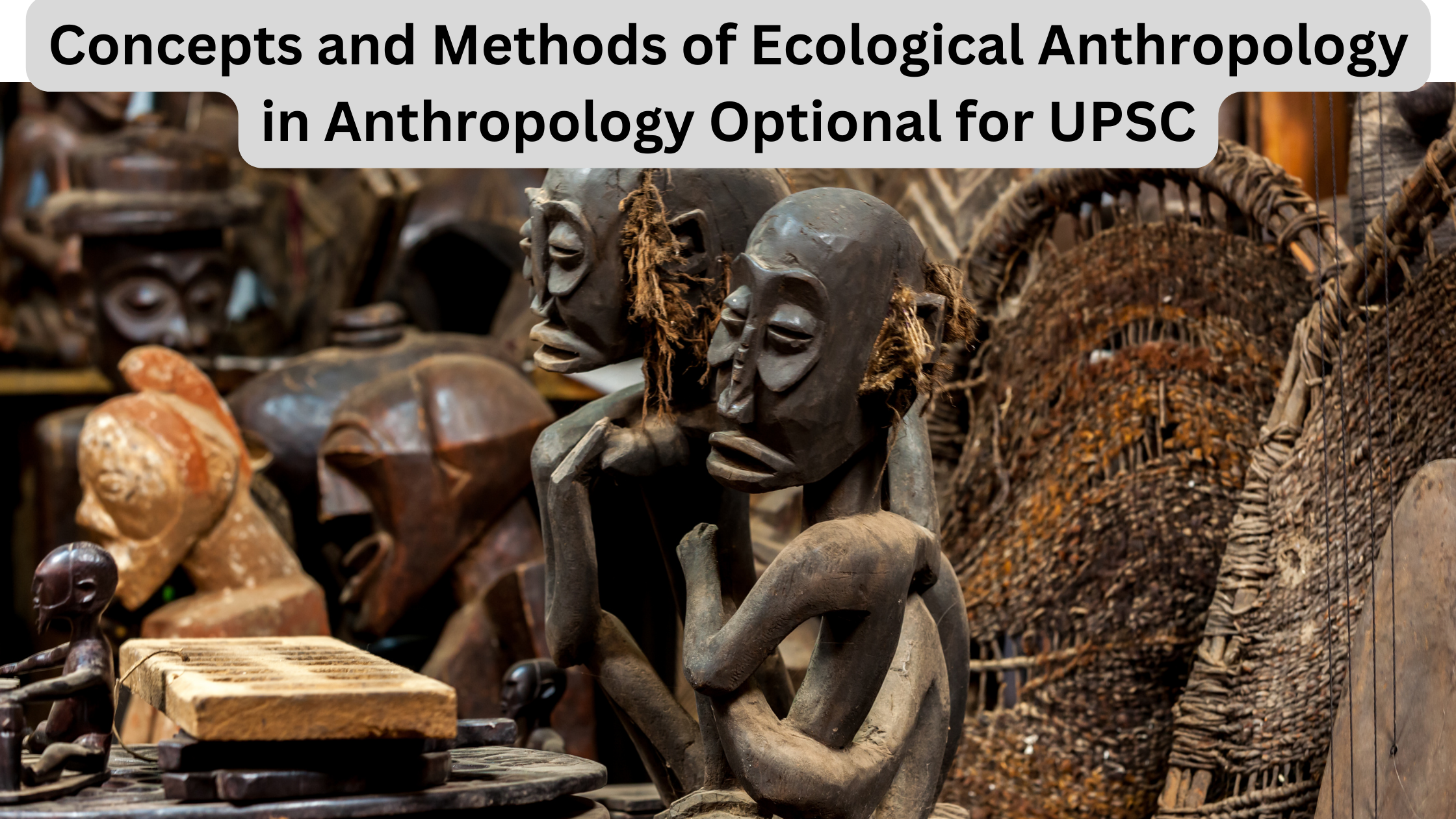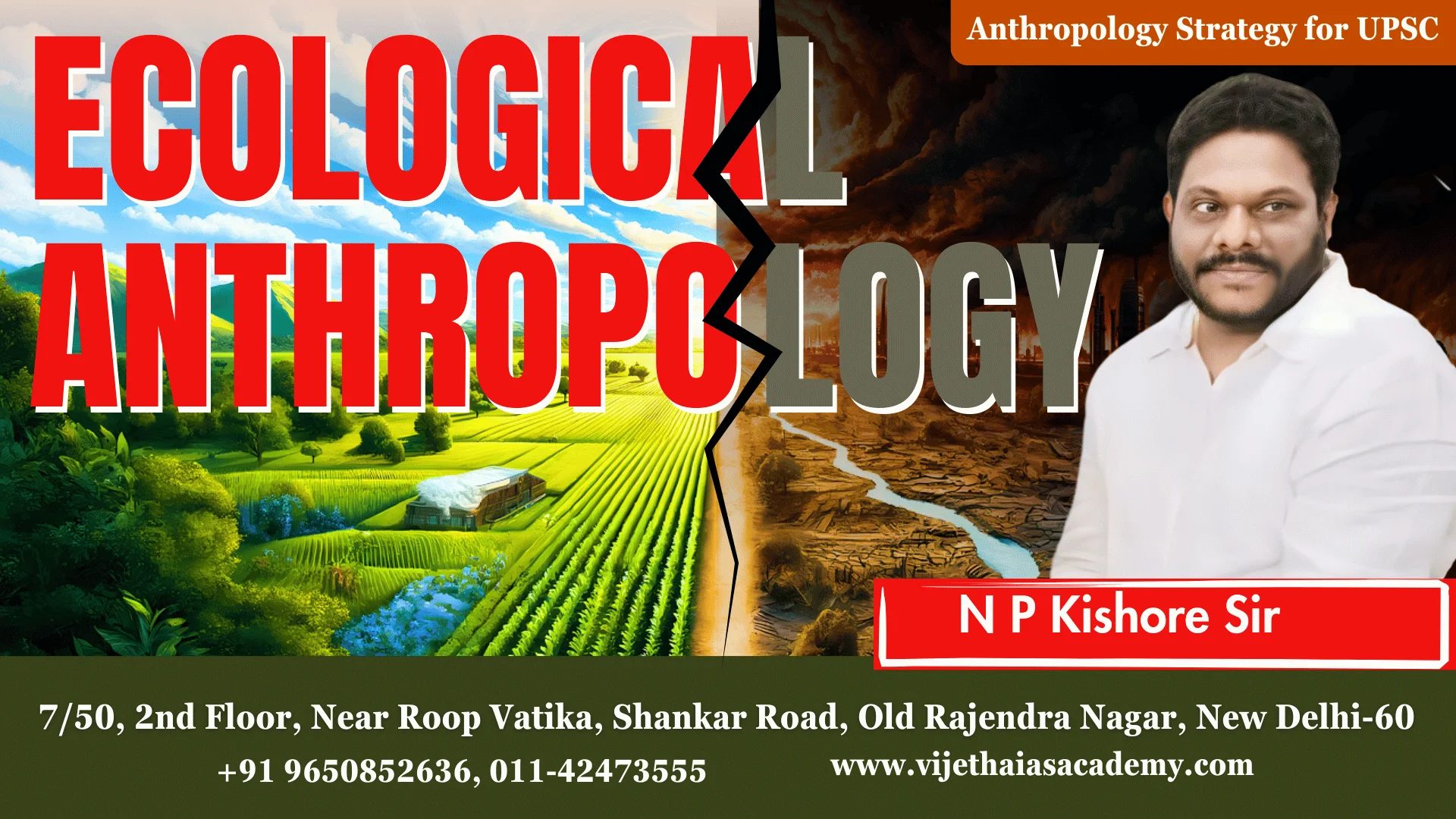
Concepts and Methods of Ecological Anthropology in Anthropology Optional for UPSC
Ecological anthropology is a fascinating subfield within anthropology that examines the complex relationships between humans and their environments. For students preparing for the UPSC exams with Anthropology as their optional subject, understanding the concepts and methods of ecological anthropology is crucial. This article provides a comprehensive overview of these topics, highlighting their relevance and applications in the UPSC syllabus at vijetha ias academy.
Introduction to Ecological Anthropology
Definition and Scope
Ecological anthropology focuses on how human societies adapt to their environments and the reciprocal impacts of these adaptations. It studies the interactions between cultural practices and ecological systems, aiming to understand how human behavior is shaped by and shapes the natural world.
Historical Context
The field emerged in the mid-20th century as anthropologists began to integrate ecological principles into their studies of human societies. Key figures such as Julian Steward and Roy Rappaport laid the groundwork for ecological anthropology by emphasizing the importance of the environment in shaping cultural and social structures.
Methods in Ecological Anthropology
Ethnographic Fieldwork
Ethnographic fieldwork is a primary method in ecological anthropology. Anthropologists immerse themselves in communities to observe and document how people interact with their environments. This method provides detailed, context-specific insights into cultural practices and ecological adaptations.
Participant Observation
A key component of ethnographic fieldwork, participant observation involves anthropologists engaging in the daily activities of the community they are studying. This approach allows them to gather firsthand information about local ecological knowledge and practices.
Interviews and Surveys
Interviews and surveys are used to collect data on individuals' perceptions, beliefs, and practices related to the environment. These tools help anthropologists understand the cultural context of ecological interactions and the factors influencing environmental decision-making.
Comparative Analysis
Comparative analysis involves comparing ecological adaptations across different cultures and environments. This method helps identify patterns and variations in human-environment interactions and understand the broader principles governing these relationships.
GIS and Remote Sensing
Geographic Information Systems (GIS) and remote sensing technologies are increasingly used in ecological anthropology to map and analyze spatial data. These tools provide insights into land use patterns, resource distribution, and environmental changes over time.
Interdisciplinary Approaches
Ecological anthropology often employs interdisciplinary approaches, integrating methods and theories from ecology, geography, sociology, and other fields. This integration enhances the understanding of complex human-environment systems.
Applications of Ecological Anthropology
Sustainable Development
Ecological anthropology contributes to sustainable development by providing insights into traditional ecological knowledge and sustainable practices. This knowledge can inform policies and initiatives aimed at promoting environmental sustainability and resilience.
Conservation
Understanding how indigenous and local communities manage natural resources is crucial for conservation efforts. Ecological anthropologists work with communities to develop conservation strategies that are culturally appropriate and effective.
Climate Change Adaptation
Ecological anthropology plays a key role in studying how communities adapt to climate change. By documenting adaptive strategies and resilience mechanisms, anthropologists help design interventions that support vulnerable populations in coping with environmental changes.
Disaster Risk Reduction
The field also contributes to disaster risk reduction by analyzing how cultural practices influence vulnerability and resilience to natural hazards. This knowledge helps in designing community-based disaster management plans that are culturally sensitive.
Relevance to UPSC Anthropology Optional
The concepts and methods of ecological anthropology are integral to the UPSC Anthropology optional syllabus. Candidates need to understand these topics to address questions related to human-environment interactions, sustainable development, and cultural adaptation effectively.
Key Areas to Focus On
- Foundational Concepts: Study the key concepts such as cultural ecology, human-environment interaction, adaptation, and systems theory.
- Ethnographic Methods: Understand the importance of ethnographic fieldwork, participant observation, and interviews in ecological anthropology.
- Interdisciplinary Approaches: Explore how ecological anthropology integrates methods from other disciplines to study complex human-environment systems.
- Applications: Learn about the practical applications of ecological anthropology in sustainable development, conservation, climate change adaptation, and disaster risk reduction.
Recommended Study Resources
To prepare effectively, consider enrolling in specialized courses offered by Vijetha IAS Academy and seeking guidance from experts like Kishore Sir Anthropology. These resources provide tailored study materials and expert insights that are invaluable for UPSC preparation.
For more detailed courses and resources on Anthropology, visit the Vijetha IAS Academy website.
Conclusion
Mastering the concepts and methods of ecological anthropology is essential for UPSC aspirants opting for Anthropology. This field provides profound insights into the intricate relationships between humans and their environments, highlighting the importance of sustainable and adaptive practices.
By leveraging the expertise offered by institutions like Vijetha IAS Academy and guidance from seasoned educators such as Kishore Sir Anthropology, students can significantly bolster their preparation and improve their understanding of ecological anthropology.
For more information on our courses, visit our Anthropology Courses page. Explore our Test Series and Online Courses for flexible learning options.
Frequently Asked Questions (FAQ'S)
____________________________________________________________________________________________________________________________
1. What is the best coaching institute for Anthropology optional?
Anthropology is the scientific study of humans, their societies, cultures, and evolution. It is considered an excellent optional subject because:
- Scoring Potential: The subject is factual and analytical, which makes scoring high relatively achievable.
- Overlap with GS Papers: Topics like society, culture, and tribal issues overlap with General Studies Papers I and II.
- Concise Syllabus: The syllabus is precise, making it easier to complete within a short period.
2. Is Anthropology optional good for UPSC?c
Yes, Anthropology is highly scoring. With the right guidance and consistent practice, many aspirants score 280+ in this optional. The straightforward nature of questions, combined with limited subjectivity, allows candidates to score well.
3. Who should consider choosing Anthropology as an optional?
Anthropology is suitable for aspirants from various academic backgrounds, particularly those who:
- Have an interest in human evolution, society, and culture.
- Prefer a subject with minimal technical jargon and straightforward concepts.
- Want a subject that complements topics in General Studies.
4. Why should I choose Vijetha IAS Academy for Anthropology optional?
-
Vijetha IAS Academy is highly recommended for its:
- Comprehensive study material.
- Daily Answer Writing Program.
- Guidance from N.P. Kishore Sir, a veteran in Anthropology coaching.
5. How important is daily answer writing for Anthropology optional?
Answer writing is crucial to scoring well in the Anthropology optional. Programs like the Anthropology Daily Answer Writing Mentorship at Vijetha IAS Academy help students improve their writing skills and presentation.
These challenges can be overcome with the right guidance, such as expert mentorship from N.P. Kishore Sir at Vijetha IAS Academy.
6. What is the success rate of Anthropology optional in UPSC?
Yes, diagrams play a crucial role in Anthropology answers. Well-drawn diagrams can:
- Make your answers visually appealing.
- Enhance clarity and comprehension.
- Fetch additional marks, especially in physical anthropology topics like evolution and genetics.
7. Is Anthropology suitable for candidates without a science background?
Absolutely! Anthropology is a balanced mix of science and social science. The subject is presented in a way that even candidates from non-science backgrounds can understand and excel in it with proper guidance.
8. How can I access online Anthropology optional coaching?
Institutes like Vijetha IAS Academy offer comprehensive online courses, live classes, recorded lectures, and answer writing mentorship programs for Anthropology optional.
9. What role does coaching play in Anthropology preparation?
Coaching provides structured guidance, conceptual clarity, and practice. Vijetha IAS Academy, under the mentorship of N.P. Kishore Sir, offers comprehensive courses tailored to Anthropology Optional, including daily answer writing sessions and detailed study material.
10. Is Anthropology better than Sociology or Geography as an optional?
Many students find Anthropology more scoring and concise compared to Sociology or Geography. The choice depends on individual interest and aptitude.
11. Is daily answer writing necessary for Anthropology?
Yes, daily answer writing helps in:
- Improving speed and accuracy.
- Refining presentation skills with diagrams and examples.
- Developing exam-ready confidence.
Platforms like Anthropology Daily Answer Writing Mentorship by Vijetha IAS Academy can provide expert feedback and consistent practice.
12. Where can I find the best coaching for Anthropology Optional?
For aspirants looking for expert guidance, Vijetha IAS Academy is considered one of the best for Anthropology Optional. Their student-centric approach, extensive experience in mentoring, and focus on conceptual clarity make them a top choice.
13. How do I choose the right coaching for Anthropology optional?
-
Look for factors like:
- Experienced faculty (e.g., N.P. Kishore Sir).
- Comprehensive course structure.
- Answer writing mentorship.
- Student reviews and success stories.
14. Does Vijetha IAS Academy provide personalized mentorship?
Yes, the academy is renowned for its student-centric approach, offering tailored guidance and support to each aspirant.
- Join peer study groups or mentorship programs.
- Set achievable daily goals.
- Seek guidance from experienced mentors like N.P. Kishore Sir at Vijetha IAS Academy.
_________________________________________________________________________________
15. What are the latest trends in Anthropology optional preparation?
- Focus on case studies and tribal issues.
- Participation in answer writing mentorship programs.
- Digital resources and online coaching.
For more information on our courses, visit our Anthropology Courses page. Explore our Test Series and Online Courses for flexible learning options.

